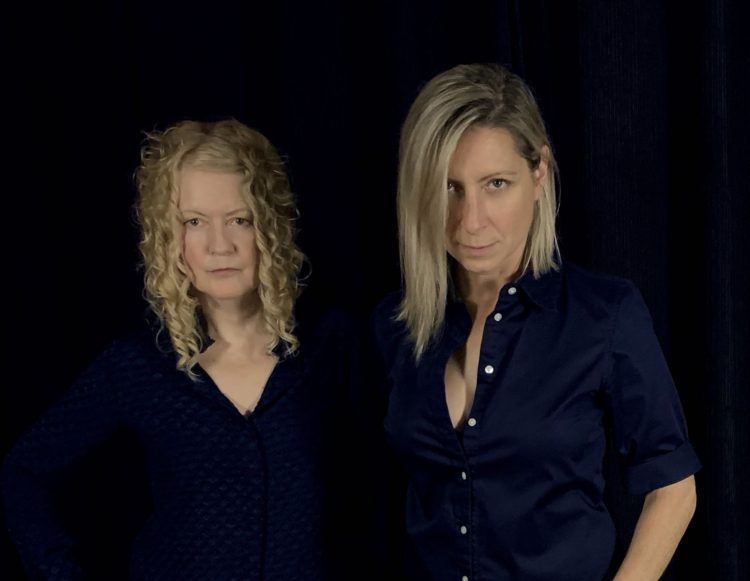
As the oft-used expression states, the best things in life are worth waiting for. Fans of Kingston, Ontario-based singer/songwriter duo Kris + Dee have waited for four years for new material, patiently anticipating the fruit of the talented pair’s creative labours, and understanding that sometimes life intervenes, but that those interventions can be uplifting and insightful fodder for the artistic process.
Such was the case in the lead-up to the Oct. 1 release of Browse Line, Kris + Dee’s fourth studio album, coming four years after the acclaimed A Great Long Game. Part of the interregnum was for practical considerations, as Dee McNeil’s non-musical career shifted considerably with a big promotion with the health care sector, and Kris Abbott reunited with her former bandmates in 1990s alt-rock darlings The Pursuit of Happiness for a round of reunion shows to celebrate the 30th anniversary of the band’s iconic album Love Junk.
Abbott and McNeil also do not treat writing and recording music as trifling, hasty or by the seat of one’s pants proposition. There is an extraordinary amount of thought, soul searching and self-examination that come into play before the record button is every pushed.
It has always been thus over the duo’s first three studio albums, but it seems Browse Line involved an even more intensive and comprehensive preparatory process and Kris + Dee used their time to imbue their new compositions with a profound sense of reality and urgency, as well as a broad array of emotional texture and meaning due in large part to significant changes in both of their lives as individuals and as a couple.
“Each album we put out is kind of the end of a certain phase of life, and I think this group of songs represents that. It’s the end of a certain phase in our lives; we have processed things, we have done the sense making thing with the events that have happened in our life, whether that be family conflicts or stresses at work, or new friendships or losing other friendships, to world politics and all of those sorts of things that just get put into the musical melting pot and begin to make a cohesive, tangible item called an album,” said McNeil.
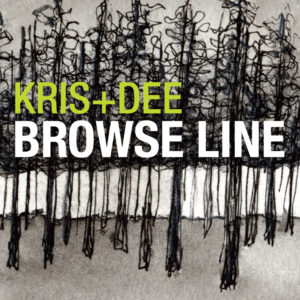 “Over the past few years there was a lot of loss, there was a lot of family conflict, there were people that we loved dearly who moved away to other countries that we don’t see any longer. There was just a general societal ramping up of conflict and tension that precipitated songs such as Walden which has kind of a spirit of withdrawal or self isolation. There’s the whole crisis of faith thing, with a song like Don’t Get the Universe which is questioning why do hard times fall upon good people? Simple Little Sheep is just us questioning the world and having a moment of introspection and realization that there’s a room full of powerful men somewhere in the world that puppet and engineer everything we do in our live from what are the political trends, what are the environmental trends, what are the technological trends, what are the entertainment trends.
“Over the past few years there was a lot of loss, there was a lot of family conflict, there were people that we loved dearly who moved away to other countries that we don’t see any longer. There was just a general societal ramping up of conflict and tension that precipitated songs such as Walden which has kind of a spirit of withdrawal or self isolation. There’s the whole crisis of faith thing, with a song like Don’t Get the Universe which is questioning why do hard times fall upon good people? Simple Little Sheep is just us questioning the world and having a moment of introspection and realization that there’s a room full of powerful men somewhere in the world that puppet and engineer everything we do in our live from what are the political trends, what are the environmental trends, what are the technological trends, what are the entertainment trends.
“And I think just by the very fact that the songs have been recorded means that the issues and that season in our lives has kind of been transcended, in a weird way. It’s been sort of processed and left there. And I think some of the theses or concepts we do take forward into a different way, but a lot of them we now leave behind.”
Abbott concurred, adding that in many respects it is the responsibility of artists, especially those who have a sensitive and enlightened moral compass and world view, to say the things that need to be said when things are going wrong.
“There comes a moment of truth when you have to be brave enough to set forth this set of questions to yourself as an artist. That’s kind of what we feel is partly our job is to pose those big questions and then be brave enough to follow through the thought process as to what the answers are. Even though the questions are hard and the reality of many of those issues is pretty bleak, the process is actually very positive and empowering when you come to the realization that for every tough question you have, there’s a whole bunch of new answers and new journeys,” she said.
“For example, in the song, Politics Are Thicker Than Blood, on the surface if you were to look at it from a very literal point of view, in a very black-and-white perspective it sounds very dark and very finite. But in fact, it’s actually very positive because when you run into those really deep conflicts, new journeys come out of them. When you lose one thing, you have an opportunity to gain a new relationship. You may lose a family relationship over politics, but you may find a new relationship through the process, a new opinion on something that is really enriching. That moment of choice and enlightenment is actually really positive, and it doesn’t come out of the Pollyannas of the world, it comes out of that moment where you actually are okay to ask yourself some really tough questions.”
Another aspect of the creative process leading to browse line involved a natural evolution in the songwriting process between Abbott and McNeil.
“Dee spent a lot more time writing on her own. In the past we would write together, and Dee has always been the genesis portion of our songwriting, but she would bring the songs and we would work on them together and then there would be a lot of back and forth. This time, she spent a lot more time writing alone – she had come to the table with way, way later in the songwriting process than she has ever before. So, her journey, her songwriting process what different from that perspective,” Abbott explained.
“In general, it felt that the nature of the type of songs that we were writing had to be very organic, everything had to be natural; it had to be an unforced thing. We knew very early on that we weren’t going to be forcing it to timelines or worry about whatever anyone else is doing. It was more apparent than ever that it had to be what was right for us.
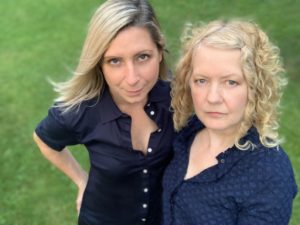
“I think the evolution of our songwriting is part of our big picture of the fact that we want to make music for a very long time. And if we want it to be meaningful to us and be meaningful to the people who listen, we’re okay with the slow progress of making those relationships almost one at a time. We say this over and over again, but the sustainability factor is really important to us. We just want to make sure that whatever we do feels really authentic to us and that it feels authentic to the people that we’re connecting with. It’s really hard not to get swallowed up in what everybody else is doing as far as making music and the industry, but it never works for us when we do.”
For her part, McNeil also feels that on Browse Line the pair have reached a new plateau as far as the emotional integrity, strength of conviction and connectivity of the songs, which comes from a philosophy that emphasizes artistry over bald-faced commerciality, a facet of Kris + Dee that has always been a part of their collective ethos, but which gets more entrenched and more adamant with each new album.
“Music for us is, first and foremost, a means to process life and a means of self-expression and art. If that is something that resonates with others, great. We don’t set targets for world domination or growing anything outside the realm of being very organic about it because we’re really appreciative and touched if our music resonates with anybody – that means a lot to us. We don’t get caught up in the industry hype of selling this much or playing this much or having this many fans or this many followers. We have a lot of faith that our music will find its way to the right people at the right time,” she said.
“I think our writing process has become a lot more intuitive. Sitting down to write a song used to be based on the early artists that influenced me and the recipe was probably two or three verses, a chorus, a bridge … you sort of write to an internal recipe or cadence that you’ve been shaped by. As time moved on, I think the actual structure of the songs has changed. Sometimes there are songs that have one verse and a chorus or two verses and a chorus, or this strange sort of verse/chorus mash-up. And I have found that the songs are a little easier to write when I actually get inspired by the ideas and don’t worry about the structure. I also leave a lot of space now for Kris because the way Kris communicates is through her guitar. The songs are little more spacious and leave a lot of room for when she gets a hold of the concept she equally gets as much space to say what she needs to say in a song.”
And, again, unlike most songwriters and bands, there is no waste coming from a Kris + Dee writing process, as ideas worth pursuing are worth pursuing right up to and including recording them and ensuring they are on the album – and on the album in an order that has an appropriate logic and flow.
“We don’t write a bunch of material and then decide what are the best songs to put on an album. We write with a concept in mind right from the very beginning. One song usually leads to another and so on. When we’re writing, at some point there are usually a couple of songs that help us identify what that overall concept or theme and then we continue writing to that arrangement. Again, getting back to that thing that we always keep in touch with. For everything that we do, it’s about what it means to us as artists. We really, really do figure out what a song, what an album means to us and how does it fit into our lives,” said Abbott.
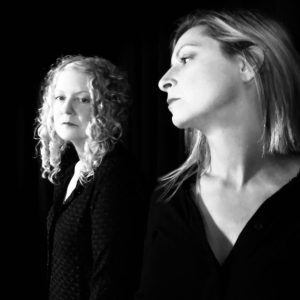
“An album is a collection of art. It’s similar to asking a painter to paint just one painting, and for their whole story to exist in only that one painting for them to not have a series of paintings that belong to a certain time period and a certain set of experiences that are inspiring those paintings. For us, it’s about artistic expression. We know that people stopped really buying music a lot time ago, but we still put music out there. It exists and either someone will find it, or they won’t. But if we try to change the way that we want to express ourselves because of what the current trends and standards are, we’re making other people happy, we’re not making ourselves happy. We are only concerned with what it takes to tell the story and for us it takes more than one song.
“And sequencing is another related topic. We pay a lot of attention to the sequencing of the songs on the album. It you were to actually listen to the record from start to finish, it’s a very, very, thoughtful process. That’s what it means to us – it’s whatever it takes to tell the story.”
The title track uses the metaphor of the always changing, always enigmatic beauty of nature to represent the eye-opening reality that relationships – of many types – are not always what they seem.
“It was inspired by a canoe trip that Kris and I had. We had a day of canoeing up at Gould Lake [just north of Kingston] and just looking at that big beautiful lake and seeing this neatly trimmed skirt of trees across this whole lake, it’s such a beautiful visual from a distance, it’s so striking. But knowing what it really is, which is deer eating to their limits, that the can reach a point of literally eating the plant life so much that they get to the point of starvation or the need to evacuate a territory, gives it a different perspective,” said McNeil.
“It represents devastation. It represents the changing of an ecosystem that will never be the same again – those scarred trees, the deer themselves. We were struck by that metaphor that something from a distance can be so beautiful and we have such an appreciation for it, but when you get up close and see what it actually is, it’s a lot of scarring and devastation. We worked that metaphor up and I think it rings true for a lot of relationships and the need to love and love from a distance and appreciate from a distance because getting too close just leads to damage and destruction.”
McNeil also offered some insight into some of the other songs on Browse Line.
“No Tattoo is actually about the human phenomena of wanting to express yourself, but you’ve got this head full of ideas and are just not able to pull it all together into a thesis – just that overwhelming feeling of information overload. And it came about from having that kind of moment: I had a head full of philosophies and I was reading everything from Plato and Kant and Nietzsche and all that stiff, and Thoreau – I was reading a lot of philosophers at the time and my head was full of ideas and I was struggling to pull something together. I think it’s something that happens for lots of reasons and I think we all experience those moments,” she said.
“Settled Down is a feminist country song. Kris and I are both from the Ottawa valley, we grew up on country music and this song just started coming out during the writing. We realized when we look around, as women we have felt and we have seen in others this sort of limitation imposed, often by the men in their lives. This particular song is about those limitations that are put on women because of the expectations that are put on them by partners and fathers, etc.
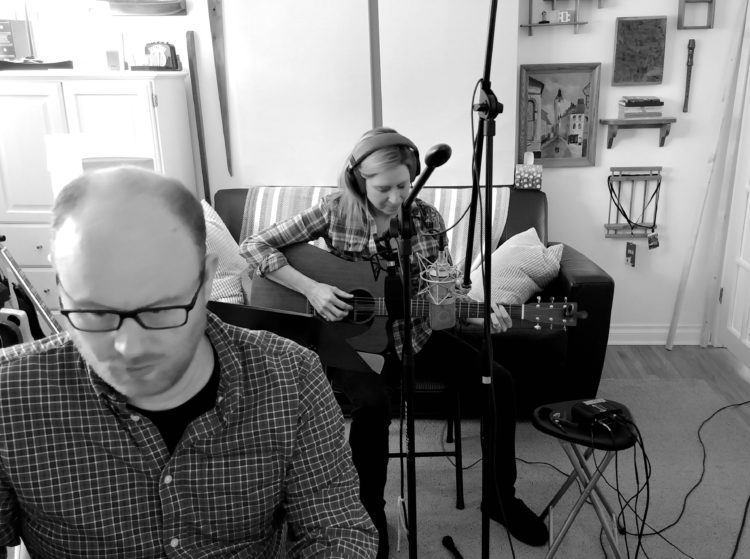
“Walden is another anchor song on the record. It represents the notion of withdrawing and not really understanding society and maybe not really liking society that much. It’s thinking about the way society is so self-centred, so superficial, it’s all about the cult of personality. There’s not as much community mindedness and it’s kind of wrapped up in the whole social media phenomena. If you listen to the song closely, my tone of voice changes towards the end to where it’s pretty lighthearted; there’s almost a bit of a chuckle in the very, very last line of the song. Which gives the whole message a bit of open-endedness, where there are so many answers that could come from it.”
Browse Line is a immersive listening experience, where the sonics, the musicality, the words, and the emotion of all the performances, from vocal to instrumental, to the choices during the production and engineering processes of producer/collaborator Aaron Holmberg of Full Frequency Productions are seamlessly integrated into an overall sound that is exceptionally compelling, filled with meaning, and which demand multiple listening.
It all comes back to the importance of connection. Kris + Dee connect with one another as a couple, as a creative force – that is the beginning. Then the connection moves to those who will hear their songs in either a live setting, or through their speakers or ear buds.
“It’s so important to us that all we know how to do is be sustainable and exist and be self-sufficient and make music that can reach people organically, and I mean truly organically. People come and go from all that popularity, job positions come and go, relationships come and go. But no matter what if we know how to make music and we know how to reach out to people who have similar interest, who are like minded and perhaps open up dialogue where maybe we actually don’t think the same, but where there is somewhere to exist through artistic expression and be able to open up conversations organically, then we’re not losing anything that we’ve made. But if we’re making music to be popular, we have everything to lose,” Abbott said.
After performing a special show in Napanee, Ontario at the Lennox & Addington County Museum on Nov. 28, Kris + Dee will take the rest of 2019 off touring wise but are planning to book shows in Ontario and the Maritimes in 2020. For both McNeil and Abbott, playing live is – continuing with the theme of their music in general – about connection first and foremost.
“We will be doing small tours in various places, but the idea of playing just for the sake of playing, where the emphasis is making money for us and making minimal relationships is not for us. If it’s not about real relationships, and meaningful connections, we’re not interested,” said Abbott.
“We want every show to feel special. We want to feel that we’re arriving with people who like our music at the same point, as opposed to flogging them constantly on social media to come out to a show. It just feels organic to do it this way,” added McNeil.
For more information on upcoming shows, Browse Line and more, visit https://krisanddee.com.
- Jim Barber is a veteran award-winning journalist and author based in Napanee, ON, who has been writing about music and musicians for nearly three decades. Besides his journalistic endeavours, he now works as a communications and marketing specialist. Contact him at jimbarberwritingservices@gmail.com.
SHARE THIS POST:
